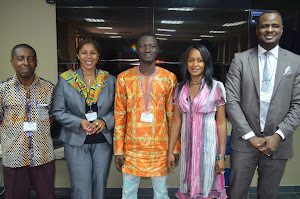By Edmund
Smith-Asante
 |
| Mr Harold Esseku addressing the meeting |
A pilot
project started to track funding for the water and sanitation (WASH) sector of
the country has been stalled by scanty and unavailable data from institutions
that receive and utilise such funds.
It is
being supported by the World Health Organisation (WHO), which is partnered by
UNICEF on the platform.
At a
meeting of the Water and Sanitation Sector Working Group yesterday, the
consultant spearheading the project, Mr Harold Esseku (Rapha Consult) expressed
his frustration at the turn of events.
He said
as a result of the difficulty in receiving data from the sector’s institutions,
he was still collecting data for a project that should have ended a long time
ago.
“From the
middle of April, the next time I got data was the second week of July and then
last week Friday. So you can imagine that the whole of May and the whole of
June was almost impossible to get any additional data apart from what was
readily available which was given to us at the beginning,” he stated.
Purpose of project
Addressing
the meeting, he said the project was aimed at finding out the total expenditure
in the WASH sector, those who paid for WASH services and how much they paid,
the main funding channels for the sector and how the funds were distributed to
the different WASH services, as well as the expenditure types.
With
specific reference to Ghana, he said the project was aimed at finding the total
funding to the water and sanitation sector, whether it was sufficient to meet
policy priorities, sector plans and targets and how the funds were distributed
for the different components of WASH services such as operation and maintenance
for sustainability.
The
project is also aimed at finding the share of spending by development partners,
households and the government, the main channels of funding in the WASH sector
and the relation between budgetary allocation to the channels and actual
spending.
Key
organisations to be covered by the project include the ministries of Finance
(MoF); Water Resources, Works and Housing (MWRWH); Local Government and Rural
Development (MLGRD), Environmental Health and Sanitation Directorate (EHSD),
the Ghana Statistical Service (GSS) and Water Resources Commission (WRC).
Others
are the Community Water and Sanitation Agency (CWSA), Ghana Water Company
Limited (GWCL), the Coalition of NGOs in Water and Sanitation (CONIWAS),
metropolitan, municipal and district assemblies (MMDAs) and development
partners (DPs).
Data obtained
According
to Mr Esseku, although some data was obtained from the WRC, CWSA, GWCL, EHSD
and MWRWH for the periods spanning 2010 to 2013, just scanty data was received
from five MMDAs in the Greater Accra Region, which could not be used.
He said
from the MoF, data was obtained from multilateral and bilateral agreements for
projected disbursement and actual disbursement, but none was received for the
Government of Ghana (GoG) budgetary allocations and actual disbursements.
Key lessons
Mr Esseku
said although the project had stalled, some valuable lessons had been learnt
which informed certain steps that needed to be taken for similar exercises in
the future.
He listed
some of these as the provision of a questionnaire which was in line with
existing data management systems, putting in place the level of disaggregation
on data collection mechanisms, while more efforts were needed to undertake
nationwide data collection for the 216 MMDAs.
The
consultant also stated that the passing of the Right to Information Bill,
making clear the need for data well in advance and involving senior-level
stakeholders were all steps that would be taken.
Elimination of open defecation
Mr
Stephen Ntow, another consultant, touched on a national campaign to eliminate
open defecation and establish the norm of using toilets.
He said
its objective was to promote the social norm of using latrines and would use
social icons and several partners, with the President leading the way.
A
programme officer at the EHSD, Mr Kweku Quansah, said Ghana hoped to eliminate
open defecation by 2020 and in the short term reduce the current rate of 18 per
cent by 8 per cent.
Mr Jesse
Coffie Danku, WASH Advisor of SNV Netherlands Development Organisation, proposed
a national customised form of latrine for low-income communities that would
deal with the incidence of open defecation.
For his
part, Mr Tony Akuamoah-Tsekpetse, EHSD, said open defecation-free communities
in seven regions, excluding the Ashanti, Greater Accra and Western regions, had
increased from 97 in 2010 to over 2000.
Writer’s
email: Edmund.Asante@graphic.com.gh
This was first published by the Daily Graphic on August 11, 2014





No comments:
Post a Comment